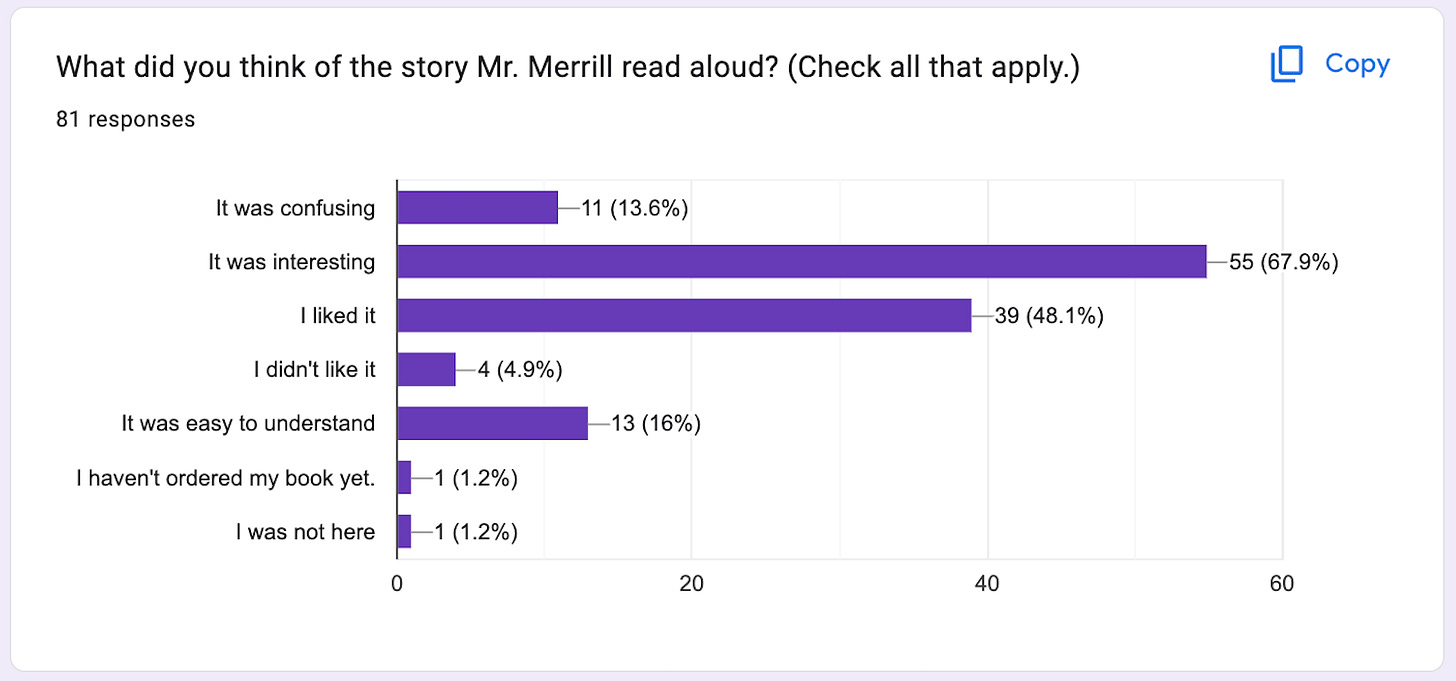02: Using Student Data Can Be Easy
Gathering impromptu data may be the most valuable change I've made this year.
Welcome to Field Reports!
Every two weeks I update you on the status of my classroom and pedagogical design.
For creative writing and ELA activities to use in your class, check out Plug & Play!
OBSERVATIONS
Impromptu Data
Sometimes it’s hard to tell if students enjoy a lesson or find it helpful. I’ve started to just ask them.
I shared a note here on Substack this last week about using quick, made-in-class Google forms to get feedback from students. I make these forms during class because I’m unsure what specific data I want until I’m in the middle of the lesson.
When I read a short story to the class and try to cultivate a post-story discussion that doesn’t really get off the ground, it’s easy to feel insecure. Maybe they didn’t like the story? Maybe it was confusing? Maybe I’m not a good story reader… But then I gather data and realize that most students actually enjoyed the story.
Do not let your eyes and ears deceive you. You may think the lesson flopped because they didn’t talk, but in reality they maybe really liked the class.
Always Show Your Hand
I like sharing data with students. For example, I gathered data from the pre-assessment and showed them that not many people knew the concepts we’d be learning. Then I showed them the data after we’d done some lessons.
This is where y’all were at at the beginning of the year; here’s where the class is now. Look at y’all learning things already.
Growing Lesson Content from Student Work
I feel like a better teacher because we’re collectively engaging with the artifacts of our learning. Right now I’m helping my sophomores write great summaries; I’m helping my juniors with authentic analysis. We’ve practiced and talked about attributes of great summaries/analyses. I take student paragraphs from one class period, make them anonymous, and then show them to a different class period. We’re able to investigate what people are doing well at and areas we need to improve in.
It seems like the students were more engaged and learned more during these lessons:
Emotional Stamina
There are few professions where you daily encounter emotional needs from all across the board. Students who come in hyper, encroaching into the space of others; students who are over-the-moon excited because the person they asked out said yes; students who are going in for surgery; students whose surgery didn’t go well; students who are prepping for a big competition; students who are depressed and suicidal; students who are deeply lonely.
As a teacher, it feels as though you stand in the middle, more aware than most of the crazy combination of experiences and states-of-being in the room at the same time.
Teaching is a Privilege
It’s special being a part of my students’ lives. Here are some examples from the past few weeks:
A student asked me to come visit his ceramics class during my prep period so he could show me his project.
I had two students that I taught in previous years come in at separate times and ask me to read their writing. They wanted to know what I thought of it.
Someone came in to tell me all about this new book he found. As he left he said, “Ah Merrill, I just love reading!!”
A student from two years ago came in to tell me about who he’s going to homecoming with.
Moving Away From Formulaic Writing
I’m yet to be satisfied with how my teaching of analysis goes. In previous years, I fell in line with what my department typically did: teach the formula of claim, evidence, and elaboration.
In doing so, students could confidently talk about each of these elements, but when it came to writing an analysis, they were too stressed about matching a formula that, half of the time, they weren’t even conscious of what they had written. They tried creating the elements separately rather than organically. It resulted in half-baked, choppy thinking and pretty dreadful writing.
This year, I haven’t taught the formula. I’ve tried to help students realize that analyzing is simply talking about what you notice in a text. What are the things that are noteworthy? I think it’s a step in the right direction, but I don’t know if it’s doing it quite yet.
I think I’ll need to reframe it, finding examples from pop culture, and help them understand that, when there is good art, people talk about it. Analysis is just people saying cool things about cool things. Gotta demystify, gotta de-schoolify.
READING NOTES
Taste vs Consumption
“Mother Siluana Vlad said that in the beginning man lived by taste, and not through consumption.”
—
Milk Before Meat
“While students need high-quality reading instruction and exposure to notable texts and thinkers throughout history, it’s unlikely that many young people will become lifelong readers through academic reading alone. Reading engagement increases when readers receive encouragement for pursuing their own inquiry and interests. Readers further build reading preferences through free choice (Miller & Kelley, 2013).”
—
Don’t Make the Ride Smooth
“I remember reflecting on lessons and making adjustments based on the questions asked so future students would get a better experience…My lectures, clear and thorough as they were, left students’ minds in a passive state…To activate students’ minds and better input information, educators can present discordant ideas that require the learners to engage and resolve them (what neuroscientists call desirable difficulties[)]” (39).
— Bill Zima, Mindsets and Skills Sets for Learning
Thank you for reading!! If you have insights to share related to the topics I’ve discussed, I’d love to hear from you.
📼 My collection of videos to start class.
🖋️ Poems I share with my students.
🎹 My playlist of gentle music.
📚 What I’m reading/highlighting.









